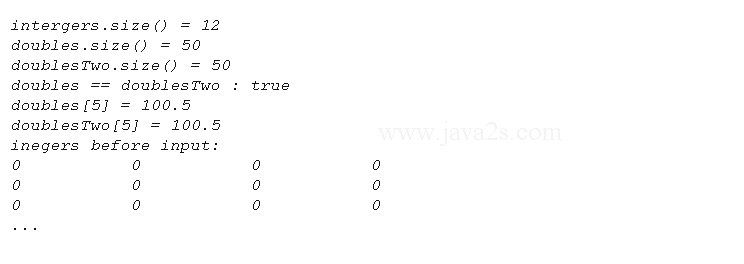Create Array class template - C++ template
C++ examples for template:template class
Description
Create Array class template
Demo Code
#include <iomanip> #include <iostream> template <typename T> class Array {// www . j a v a 2 s.c o m template <typename U> friend std::istream& operator>>(std::istream&, const Array<U>&); template <typename U> friend std::ostream& operator<<(std::ostream&, const Array<U>&); public: // default constructor explicit Array(int arraySize = 10) { if (arraySize > 0) size = arraySize; else throw std::invalid_argument("Array size must be greater than 0"); ptr = new T[size]; for (int i = 0; i < size; ++i) { ptr[i] = 0; } } // copy constructor Array(const Array& arrayToCopy) : size(arrayToCopy.size) { ptr = new T[size]; for (int i = 0; i < size; ++i) { ptr[i] = arrayToCopy.ptr[i]; } } ~Array() { delete[] ptr; } Array& operator=(const Array&); bool operator==(const Array&) const; // inequality operator; returns negative of == bool operator!=(const Array& right) const { return !(*this == right); } // subscript operator for non-const objects return modifiable lvalue T& operator[](int); // subscript operator for const objects returns rvalue T& operator[](int) const; int getSize() const { return size; } private: int size; T* ptr; // ptr to first element of pointer based array }; template <typename T> Array<T>& Array<T>::operator=(const Array& right) { if (&right != this) { // avoid self assignment // for Arrays of different sizes, deallocate original left-side array, // then allocate new left-side array if (size != right.size) { delete[] ptr; size = right.size; ptr = new T[size]; } for (int i = 0; i < size; ++i) { ptr[i] = right.ptr[i]; } } return *this; } template <typename T> bool Array<T>::operator==(const Array& right) const { if (size != right.size) return false; for (int i = 0; i < size; ++i) { if (ptr[i] != right.ptr[i]) return false; } return true; } template <typename T> T& Array<T>::operator[](int subscript) { // check for subscript out-of-range error if (subscript < 0 || subscript >= size) throw std::out_of_range("Subscript out of range"); return ptr[subscript]; } template <typename T> T& Array<T>::operator[](int subscript) const { // check for subscript out-of-range error if (subscript < 0 || subscript >= size) throw std::out_of_range("Subscript out of range"); return ptr[subscript]; } template <typename U> std::istream& operator>>(std::istream& in, const Array<U>& a) { for (int i = 0; i < a.size; ++i) { in >> a.ptr[i]; } return in; } template <typename U> std::ostream& operator<<(std::ostream& out, const Array<U>& a) { int i = 0; // output private ptr-based array for (; i < a.size; ++i) { out << std::setw(12) << a.ptr[i]; // 4 numbers per row of output if ((i + 1) % 4 == 0) out << std::endl; } // end last line of output if (i % 4 != 0) out << std::endl; return out; } int main(int argc, const char *argv[]) { Array<int> integers(12); Array<double> doubles(50); Array<double> doublesTwo; std::cout << "intergers.size() = " << integers.getSize(); std::cout << "\ndoubles.size() = " << doubles.getSize(); doublesTwo = doubles; std::cout << "\ndoublesTwo.size() = " << doublesTwo.getSize() << std::endl; std::cout << "doubles == doublesTwo : " << ((doubles == doublesTwo) ? "true" : "false") << std::endl; doubles[5] = 100.5; std::cout << "doubles[5] = " << doubles[5] << std::endl; doublesTwo[5] = doubles[5]; std::cout << "doublesTwo[5] = " << doublesTwo[5] << std::endl; std::cout << "inegers before input: \n" << integers; std::cout << "\nInput " << integers.getSize() << " integer values:\n"; std::cin >> integers; std::cout << "\nintegers after input:\n" << integers; return 0; }
Result

Related Tutorials
- Writing a Member Function Template
- Implementing a Stride Iterator, You have a contiguous series of numbers and you want to iterate through the elements n at a time.
- Create Stack Class template
- Exercising the SparseArray class template
- Exercising the LinkedList template class, reverses the text that is entered